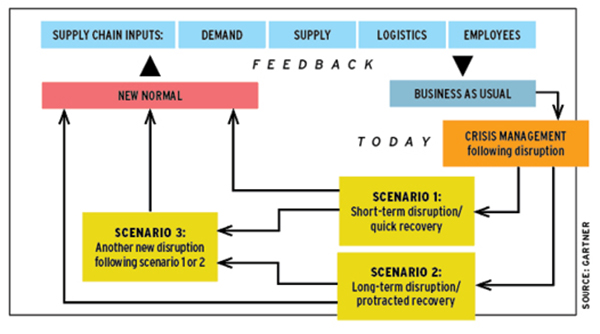These three pre-vaccine scenarios can help supply chain leaders make decisions that set their businesses up for success.
As the coronavirus continues to disrupt global supply chains, Gartner developed three scenarios to help chief supply chain officers (CSCOs) prepare for recovery and make preemptive decisions to set up their organizations for success.
Gartner polled 833 IT and IT/business professionals and found that 84% of organizations are facing varying forms of disruption—from slight disruptions to operations being reduced, restricted, or closed.
Scenario planning enables supply chain leaders to anticipate how the coronavirus disruption will unfold and identify both risk and opportunities. It provides CSCOs with the data to demand investments in supply chain resiliency and agility.
Gartner identified three pre-vaccine scenarios (see chart) that CSCOs can utilize in their decision-making. The scenarios will vary based both on geography and product.
Scenario 1: Short-term disruption. In this scenario, there is significant impact from COVID-19 in the short term, but the virus will be dealt with quickly. Eventually, restrictions are lifted, and customer confidence increases.
A quick move into the recovery phase also creates short-term competition for logistics services. Space on planes, trucks, and ocean carriers will be in high demand and result in increased costs. CSCOs must work with their logistics partners to plan ahead and prioritize shipments based on customer demand, shelf life, and anticipated competitor position.
Scenario 2: Long-term disruption. This scenario describes a world in which the virus takes longer to contain, and restrictions remain in place for many months. Customer confidence declines, and a recession follows.
In the long term, consumer behavior and spending habits may change, as financial insecurity will increase the emphasis on personal financial resilience, which may decrease spending on luxury goods. Consumers are likely to stick with e-commerce channels driven by concerns about physically shopping in store.
Scenario 3: Secondary crisis. After organizations experience either the first or second scenario, it’s also possible that a second disruption will follow—caused by COVID-19, natural disasters, or other major incidents. Therefore, it is important that CSCOs learn from the current crisis and improve their supply chain’s resilience to all forms of disruption.
By Felecia Stratton
Source: https://www.inboundlogistics.com
CUT COTS OF THE FLEET WITH OUR AUDIT PROGRAM
The audit is a key tool to know the overall status and provide the analysis, the assessment, the advice, the suggestions and the actions to take in order to cut costs and increase the efficiency and efficacy of the fleet. We propose the following fleet management audit.




